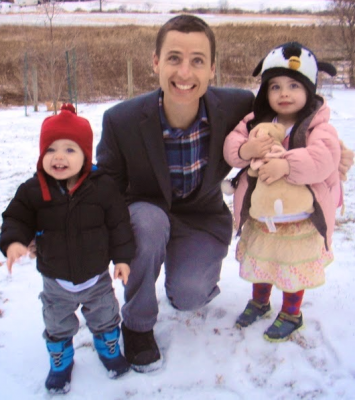Postdoc Spotlight: Nathaniel Jensen

Nathaniel Jensen is featured as part of Cornell’s Postdoc Appreciation Week 2016.
What is your area of research?
I am a development economist studying the dynamics of welfare and poverty reduction. Most of my research has focused on household strategies for risk mitigation and the use of index insurance as a tool for transferring risk. This has led me to work in the Horn of Africa, where pastoralists face a great deal of risk from drought-related shocks.
What inspired you to choose this field of study?
Between spending much of my childhood and two years in the Peace Corps in Africa, it was probably inevitable that I would end up working on poverty-related issues in Africa. I was drawn to economics because it provides a framework with which to think about the costs and benefits of decisions facing the poor and those working to help them.
Why is this research important?
Assuming that society as a whole has a moral imperative to make sure that everyone can meet their basic needs, we must better understand how shocks relate to poverty and which solutions can best support a lasting climb out of poverty.
How has your background influenced your scholarship?
My background in fieldwork keeps me focused on household level decision-making. At this micro level, you have to keep in mind a host of factors that fall outside of the domain of standard neo-classical economic work, including asymmetric information, cultural issues, mistrust, and preferences. Often such factors easily can outweigh the more easily observable metrics that are captured in data.
What else has influenced your thinking as a researcher or scholar?
The scholars and mentors that I have had the opportunity to work with over my career have been excellent role models and have taught me a lot about what to value in research.
What other hobbies or activities do you enjoy in your spare time?
I spend a lot of time swimming in creeks, hiking, coloring, playing games and dress up; pretty much whatever my kids like to do.
Why did you choose Cornell?
It was a bit of luck that brought attention to the Applied Economics program at Cornell. While writing my Master’s thesis in applied economics at the University of Missouri, Columbia, I spent a great deal of time Googling various combinations of the words poverty, resilience, livelihoods, etc. The website for the Food Systems and Poverty Reduction IGERT at Cornell always came up as a search return. One day I read the website and realized that the IGERT program was an awesome opportunity that I could not pass up. In addition to the research topic that fit well with my own interests and an interdisciplinary research approach, which I value, the program faculty was an amazing line-up of strong researchers in the field.
I jointly applied to the Applied Economics and Management and the IGERT fellowship in 2010 and was accepted to both. The Applied Economics program at Cornell was the first and only Ph.D. program that I considered.
What’s next for you?
I plan to continue working on poverty and risk-related issues from the International Livestock Research Institute in Nairobi, Kenya. If all goes according to plan, we will be moving out there in about six weeks.
Do you have any advice for current graduate students?
Take advantage of your situation as an early student. You have a unique opportunity to meet with professors and scholars without an agenda or even any obvious objective. This is a great way to learn about the breadth of your field and to become familiar with others’ interests and opportunities.
Interview by Sally Kral, communications and outreach assistant in the Graduate School
